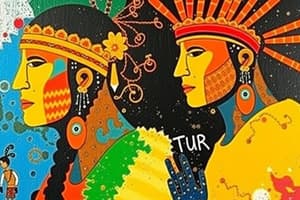Podcast
Questions and Answers
Who are the 'Nacirema'?
Who are the 'Nacirema'?
The 'Nacirema' are defined in McIntyre as a tribe of people living between Canada and Mexico who have bizarre ritual patterns that are centered around the belief that their bodies are ugly and how sadistic witches teach them ways to better their bodies and purify themselves.
What was the article 'Body Ritual Among the Nacirema' about?
What was the article 'Body Ritual Among the Nacirema' about?
The article explained the strange rituals of the Nacirema, such as women baking their heads and faces and people sticking needles into other people.
What is sociology?
What is sociology?
The scientific study of human societies and social interactions.
What is meant by 'science' and what are its goals?
What is meant by 'science' and what are its goals?
What is meant by 'social science'?
What is meant by 'social science'?
What is 'sociological perspective'?
What is 'sociological perspective'?
What is 'sociological imagination'?
What is 'sociological imagination'?
What are personal troubles?
What are personal troubles?
What are public issues?
What are public issues?
What is a society?
What is a society?
What is culture?
What is culture?
What are the main factors that contributed to the rise of sociology?
What are the main factors that contributed to the rise of sociology?
What is positivism?
What is positivism?
Who was August Comte and what did he contribute to sociology?
Who was August Comte and what did he contribute to sociology?
Who was Karl Marx and what did he contribute to sociology?
Who was Karl Marx and what did he contribute to sociology?
Who was Herbert Spencer and what did he contribute to sociology?
Who was Herbert Spencer and what did he contribute to sociology?
Who was Emile Durkheim and what did he contribute to sociology?
Who was Emile Durkheim and what did he contribute to sociology?
Who was Max Weber and what did he contribute to sociology?
Who was Max Weber and what did he contribute to sociology?
Who was Harriet Martineau and what did she contribute to sociology?
Who was Harriet Martineau and what did she contribute to sociology?
Who was Jane Addams and what did she contribute to sociology?
Who was Jane Addams and what did she contribute to sociology?
Who was W.E.B. Du Bois and what did he contribute to sociology?
Who was W.E.B. Du Bois and what did he contribute to sociology?
What is functionalism and what are its criticisms?
What is functionalism and what are its criticisms?
What is a teleology and why has functionalism been criticized as a 'teleological' argument?
What is a teleology and why has functionalism been criticized as a 'teleological' argument?
What is conflict theory and what are its criticisms?
What is conflict theory and what are its criticisms?
What is symbolic interactionism and what are its criticisms?
What is symbolic interactionism and what are its criticisms?
What is macro-level analysis?
What is macro-level analysis?
What is micro-level analysis?
What is micro-level analysis?
What is an empirical question? Give an example.
What is an empirical question? Give an example.
What is a hypothesis?
What is a hypothesis?
What is a variable?
What is a variable?
Give an example identifying independent and dependent variables.
Give an example identifying independent and dependent variables.
What are the steps of the research process?
What are the steps of the research process?
What is a sample and why do we use them?
What is a sample and why do we use them?
What is reliability?
What is reliability?
What is validity?
What is validity?
What is material culture?
What is material culture?
What is non-material culture?
What is non-material culture?
What is ethnocentrism?
What is ethnocentrism?
What is cultural relativism?
What is cultural relativism?
What is 'culture shock'?
What is 'culture shock'?
What are symbols?
What are symbols?
What is language?
What is language?
What are gestures?
What are gestures?
What are values?
What are values?
What are norms?
What are norms?
What are sanctions and what are the different types?
What are sanctions and what are the different types?
What are folkways?
What are folkways?
What are mores?
What are mores?
What is taboo?
What is taboo?
True or False: Nothing about culture is inherently 'correct' or 'normal.'
True or False: Nothing about culture is inherently 'correct' or 'normal.'
What is the 'Sapir-Whorf'/linguistic relativity hypothesis?
What is the 'Sapir-Whorf'/linguistic relativity hypothesis?
What is socialization?
What is socialization?
What are some agents/agencies of socialization?
What are some agents/agencies of socialization?
How does social class influence the way that a child is socialized?
How does social class influence the way that a child is socialized?
What are the contributions of Mead to our understanding of socialization?
What are the contributions of Mead to our understanding of socialization?
What are the contributions of Erving Goffman to our understanding of socialization?
What are the contributions of Erving Goffman to our understanding of socialization?
What are the contributions of Cooley to our understanding of socialization?
What are the contributions of Cooley to our understanding of socialization?
What are the contributions of Erikson to our understanding of socialization?
What are the contributions of Erikson to our understanding of socialization?
What are manifest functions?
What are manifest functions?
What are latent functions?
What are latent functions?
What is primary socialization?
What is primary socialization?
What is adult socialization?
What is adult socialization?
What is anticipatory socialization?
What is anticipatory socialization?
What is resocialization?
What is resocialization?
What are 'total institutions' and why are they so effective?
What are 'total institutions' and why are they so effective?
Flashcards are hidden until you start studying
Study Notes
Nacirema and Cultural Perspective
- "Nacirema" represents American spelled backward, highlighting the strangeness of some cultural practices observed in the U.S.
- The tribe exhibits bizarre rituals centered on the belief that their bodies are ugly and require purification through the guidance of "sadistic witches."
- The article "Body Ritual Among the Nacirema" critiques cultural biases by presenting American rituals in a foreign context.
Introduction to Sociology
- Sociology is the scientific study of human societies and social interactions.
- Social science aims to objectively understand the social world.
- The sociological perspective places human behavior within broader social contexts, exemplified by Hernando Washington and academic cheating incidents.
Key Concepts in Sociology
- Sociological imagination refers to the relationship between individual experiences and larger societal forces, a term coined by C. Wright Mills in 1959.
- Personal troubles relate to individual circumstances, while public issues involve societal-level matters that transcend personal shortcomings.
- A society is defined as a group sharing culture and territory.
Culture and its Dimensions
- Culture encompasses all that humans learn to do, produce, know, and believe.
- Material culture includes tangible objects, while non-material culture involves the ways of thinking and doing.
- Ethnocentrism judges other cultures by one's own standards, whereas cultural relativism seeks to understand others based on their cultural context.
Influences on the Rise of Sociology
- Significant social upheavals in Europe, including the revolutions and Industrial Revolution, contributed to the emergence of sociology.
- The expansion of imperialism exposed Western societies to different social orders.
- Success in the natural sciences provided a framework for applying scientific methods to social studies.
Foundational Sociologists and Their Contributions
- August Comte, the founder of sociology, posited the study of social statics and dynamics.
- Karl Marx contributed to Conflict Theory, focusing on class conflict.
- Herbert Spencer compared society to organisms, introducing ideas of Social Darwinism.
- Emile Durkheim studied social integration and suicide; his work established sociology as a formal discipline.
- Max Weber emphasized "Verstehen" or understanding social actions from the perspective of others.
- Harriet Martineau translated Comte's work and focused on moral values and women's rights.
- Jane Addams pioneered social justice movements with Hull House.
- W.E.B. DuBois analyzed race relations and co-founded the NAACP.
Theoretical Perspectives in Sociology
- Functionalism views society as interrelated parts working in harmony but criticized for its inability to account for change and its conservative bias.
- Conflict Theory focuses on social inequality and tensions yet fails to address social stability adequately.
- Symbolic Interactionism emphasizes individual interpretations of social interactions but overlooks larger societal structures.
Research Methodology in Sociology
- An empirical question can be answered by observing the world, such as investigating lunch choices in a cafeteria.
- A hypothesis is a testable statement about the relationship between variables, while a variable can change across cases.
- The research process involves selecting a topic, defining problems, reviewing literature, and analyzing results.
Socialization and Its Agents
- Socialization is the process by which individuals learn group characteristics, influenced by agents like family, religion, and peers.
- Social class significantly shapes childhood socialization, with differing focuses on obedience or creativity.
Theoretical Contributions to Socialization
- Mead's contributions include the concepts of the "I" and "me" and the stages of development in self-perception.
- Goffman introduced the dramaturgical approach, likening social interactions to theater performances.
- Cooley's "Looking-Glass Self" explores self-perception through the judgments of others.
- Erikson outlined eight developmental stages and the importance of identity formation during adolescence.
Functions of Social Patterns
- Manifest functions are the intended consequences of social patterns, while latent functions are unintended and often unrecognized consequences.
- Primary socialization is acquiring essential societal skills, while adult socialization involves learning new roles.
Resocialization and Total Institutions
- Anticipatory socialization involves preparing for future roles, while resocialization involves adjusting to new values or ideas.
- Total institutions isolate individuals from the outside world and facilitate control through shared experiences and restrictions on personal freedom.
Studying That Suits You
Use AI to generate personalized quizzes and flashcards to suit your learning preferences.





